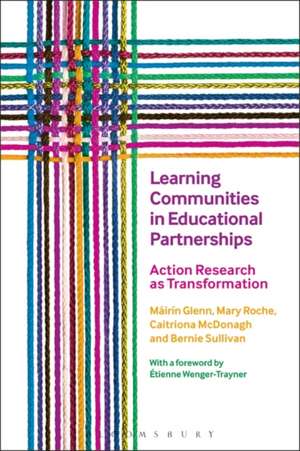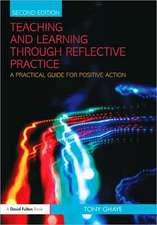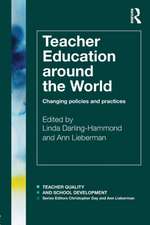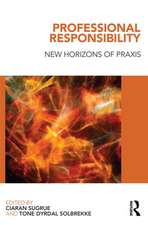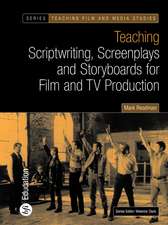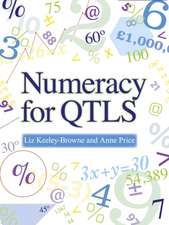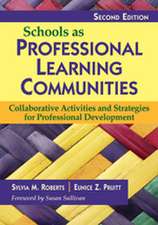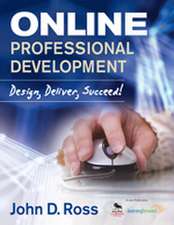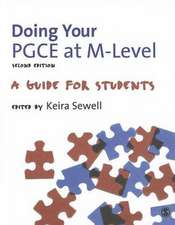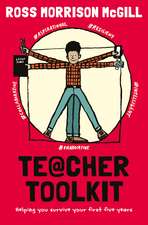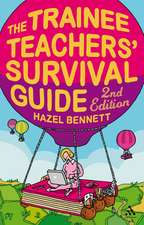Learning Communities in Educational Partnerships: Action Research as Transformation
Autor Dr Máirín Glenn, Dr Mary Roche, Dr Caitriona McDonagh, Dr Bernie Sullivanen Limba Engleză Paperback – 15 noi 2017
| Toate formatele și edițiile | Preț | Express |
|---|---|---|
| Paperback (1) | 184.59 lei 3-5 săpt. | |
| Bloomsbury Publishing – 15 noi 2017 | 184.59 lei 3-5 săpt. | |
| Hardback (1) | 567.99 lei 6-8 săpt. | |
| Bloomsbury Publishing – 15 noi 2017 | 567.99 lei 6-8 săpt. |
Preț: 184.59 lei
Preț vechi: 214.78 lei
-14% Nou
Puncte Express: 277
Preț estimativ în valută:
35.32€ • 36.67$ • 29.46£
35.32€ • 36.67$ • 29.46£
Carte disponibilă
Livrare economică 01-15 martie
Preluare comenzi: 021 569.72.76
Specificații
ISBN-13: 9781474243575
ISBN-10: 1474243576
Pagini: 200
Dimensiuni: 156 x 234 x 17 mm
Greutate: 0.32 kg
Editura: Bloomsbury Publishing
Colecția Bloomsbury Academic
Locul publicării:London, United Kingdom
ISBN-10: 1474243576
Pagini: 200
Dimensiuni: 156 x 234 x 17 mm
Greutate: 0.32 kg
Editura: Bloomsbury Publishing
Colecția Bloomsbury Academic
Locul publicării:London, United Kingdom
Caracteristici
Extremely timely and relevant given the current and continuing focus (eg. researchED initiative) on teachers' involvement in educational research and the importance of the relevance of educational research for teachers
Notă biografică
Máirín Glenn works as a teaching principal in a primary school in Co. Mayo, Ireland. She also works as a part-time tutor in the area of self-study action research with many of the teacher education programmes in Ireland.Mary Roche is a lecturer in teacher education having spent many years as a teacher. She is author of Developing Children's Critical Thinking through Picturebooks (Routledge 2015)and has developed literacy support materials for National Council for Curriculum and Assessment (Ireland). Caitriona McDonagh has spent many years as a primary teacher. She is a supervisor for school placement with the Froebel Department of Primary and Early Childhood Education, Maynooth University and supervises action research projects in Mathematics for postgrad students at the University of Limerick, Ireland. Bernie Sullivan is a former principal of a primary school in Dublin, Ireland. She has worked as a tutor for second-level student teachers on school placement with St. Patrick's College, Thurles, Ireland. She currently supervises action research projects in Mathematics teaching for postgraduate students at the University of Limerick, Ireland.
Cuprins
Foreword, Etienne Wenger-TraynerAcknowledgementsGlossaryIntroduction1. A Professional Partnership, Máirín Glenn2. Action Research as the Glue in Professional Learning Partnerships, Máirín Glenn3. Learning Communities as Sites of Transformation, Bernie Sullivan4. A Theoretical Explanation of the Practical Significance of Learning Communities, Bernie Sullivan5. Professional Conversations as Integral to Self-Study Action Research for CPD, Mary Roche6. Initial Teacher Education and School/College Partnerships: The Potential role of Self-Study Action Research, Mary Roche7. Tapping into Experiential Knowledge in Whole-School Communities, Caitriona McDonagh8. What's in This For Me? - From the Perspective of Participating Teachers, Teacher Educators and Leaders, Caitriona McDonaghConclusionBibliography Index
Recenzii
This is the most significant contribution to the enhancement of a global professionalism in education that I have read in my 50 year's engagement with this issue. It should become required reading and study for initial and continuing teacher education programs. Mairin Glenn, Bernie Sullivan, Mary Roche and Caitriona McDonagh show how four individuals, initially strangers, studying four disparate aspects of education, have forged a strong, warm and loving friendship. Their work and research together enhances their own and others' professionalism in improving practice and contributing to the educational knowledge-base. They do this through self-study action research and the generation of living-educational-theories that are underpinned by ontological values of social justice, inclusion and democracy; epistemological values of dialogue, communication and knowledge creation; and educational values of co-operation and collaboration. The book clearly communicates how to foster a 'researcherly disposition' across all phases of education. This includes the generating and sustaining of whole-school learning communities. As well as focusing on improving educational practice and generating contributions to educational knowledge, the authors critically engage with insights from the most advanced social theories, without losing a connection to improving professionalism in practice. The authors invite readers, having reflected on their book, to reveal their passions and enthusiasms for learning together, for their own benefit and the benefit of those with whom they work. They invite us to continue this narrative by sharing our stories on www.eari.ie . I hope to meet you in this space of learning community.
This book speaks to the very heart of what it is to be a professional learner. It challenges readers to rethink how we individually and institutionally engage with our own learning, with the learning of those we teach and of all those with whom we connect throughout our educative journey. Because this book transcends the superficial and engages with communities of learners from a lived, meaningful and values based perspective, it offers not the typical prescriptive text, but one that is far more significant with real potential to open up the hearts and minds of learners and teachers across the globe. It offers an important differing voice to current trends in education that tend to eclipse the value of practitioner knowledge and experience. In so doing it gives voice to the growing movement of practitioners whose experience and insight are indispensable for meaningful education theory worldwide.
This book speaks to the very heart of what it is to be a professional learner. It challenges readers to rethink how we individually and institutionally engage with our own learning, with the learning of those we teach and of all those with whom we connect throughout our educative journey. Because this book transcends the superficial and engages with communities of learners from a lived, meaningful and values based perspective, it offers not the typical prescriptive text, but one that is far more significant with real potential to open up the hearts and minds of learners and teachers across the globe. It offers an important differing voice to current trends in education that tend to eclipse the value of practitioner knowledge and experience. In so doing it gives voice to the growing movement of practitioners whose experience and insight are indispensable for meaningful education theory worldwide.
